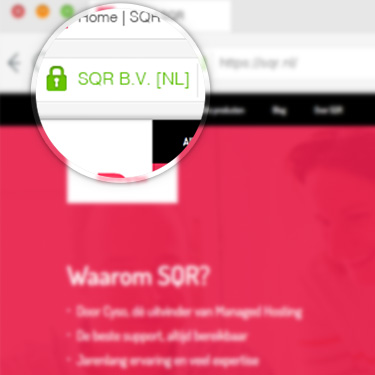Why do I need an SSL certificate?

The “little green lock” in your browser bar is a familiar sight by now, especially if you make online purchases. A sign that an SSL certificate has been installed. It means the site is secure, but what does the lock do to protect you?
To understand this, it is important to understand how information gets from the sender to the receiver. Data on the Internet has to go past a few computers and servers from point A to point B. And just like an indirect flight where you have to make a transfer, data also goes past several “stops” where it can get delayed, lost or copied by people with impure motives.
That little icon, also known as a “Secure Socker Layer (SSL) certificate,” gives the visitor confidence that the data they are adding will not be interfered with during its journey.
Suppose you leave your name on a web shop or other form on a website that does not have an SSL certificate. Once you click “send,” your typed name goes across the Internet and can be read during one of the stops. However, on a site with SSL certificate, the name “Jan Jansen” is sent as encrypted text “84tj3kjdihFJUE9hFshf933hfs943” and when it arrives at the final destination it is translated back to “Jan Jansen.” This process also applies to login codes, credit card numbers and other data secured with SSL.
To see if a Web site has an SSL certificate, you can check the browser. Secure sites start with HTTPS. Browsers for now also display the “Security Symbol” in the browser bar with such an SSL certificate to give visitors an additional sign of confidence about the company. Sites without an SSL certificate will have a “Not secure symbol,” which may already cause visitors to doubt the site’s security and not make purchases or leave information.

Secure your data with SSL
If your website collects (sensitive) information from visitors, it is necessary to request an SSL certificate. Even if you don’t collect sensitive information, omitting an SSL certificate makes your content management system susceptible to hackers. WordPress, the most widely used CMS system in the world, is sensitive if not properly secured. So make sure you have solid security.
Whether you are a consumer or web owner, it is important to see the value of an SSL certificate. Not only will it give visitors confidence and protect your business, it also helps you rank better in Google search results.
SSL, by the way, is a name of a somewhat older technology. The newer enhanced transcription technique and security is “Transport Layer Security (TLS). Although TLS largely replaced SSL several years ago, for some reason it is colloquially referred to as SSL or sometimes TLS/SSL.

